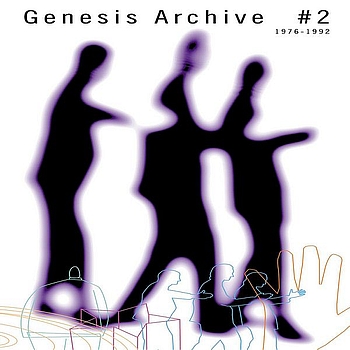
Genesis Archives, Vol.2: 1976-1992 (2000)

Disc One
1. On the Shorline
2. Hearts on Fire
3. You Might Recall
4. Paperlate
5. Evidence of Autumn
6. Do the Neurotic
7. I'd Rather Be You
8. Naminanu
9. Inside and Out
10.Feeding the Fire
11.I Can't Dance (12'' Version)
12.Submarine
Disc Two
1. Illegal Alien
2. Dreaming While You Sleep
3. It's Gonna Get Better
4. Deep in the Motherlode
5. Ripples
6. The Brazilian
7. Your Own Special Way
8. Burning Rope
9. Entangled
10.Duke's Travels
Disc Three
1. Invisible Touch (12'' Version)
2. Land of Confusion (12'' Version)
3. Tonight Tonight Tonight (12'' Version)
4. No Reply at All
5. Man on the Corner
6. The Lady Lies
7. Open Door
8. The Day the Light Went Out
9. Vancouver
10.Pigeons
11.It's Yourself
12.Mama (Work in Progress)
Unlike its predecessor, which focused tightly on the band’s formative, theatrical era, Archive 1976–92 arrives burdened by a broader scope—and a far less cohesive identity. While Volume One served as a curated shrine to the Peter Gabriel years, complete with long-lost treasures and live resurrection of The Lamb Lies Down On Broadway, Volume Two attempts to document the band’s evolution through sixteen years of stylistic transformation, lineup shifts, and commercial reinvention. The result, perhaps predictably, is a collection that feels more like a rummage through the attic than a carefully organized exhibit.
The chronology picks up, appropriately, where the first volume left off: just after Gabriel’s departure and into the early tenure of Phil Collins as frontman. From there, it threads its way through the Hackett years, the streamlined trio era, and eventually the We Can’t Dance twilight—though mercifully, no material from the brief and misfiring Ray Wilson period is included. But where the 1967–75 box was a cohesive listening experience with a clear historical arc, this set suffers from a jarring lack of narrative flow.
The primary issue lies in the sequencing. Instead of guiding the listener gently through the various stylistic epochs of the band—from the last embers of prog grandeur to the polished efficiency of their late-’80s output—the tracks are assembled in a scattershot fashion. One moment, you’re in 1977 with Steve Hackett still in the ranks; the next, you're abruptly tossed into a 1990s dance remix. The effect is disorienting. The listener is asked to leap decades in minutes, and the artistry gets lost somewhere between Duchess and a club-friendly mix of I Can’t Dance.
Still, the set is not without its rewards—especially for the seasoned fan. Disc two is entirely devoted to unreleased live material, and it is here that the compilation earns its place. True to form, Genesis avoids recycling performances from earlier live albums, offering fresh takes on deeper cuts and fan favorites. The band’s consistent excellence on stage is once again affirmed. One is reminded how the live Genesis—powered by the virtuosic support of Chester Thompson and Darryl Stuermer—was often leaner, sharper, and more explosive than their studio incarnation.
There are other highlights, too. Two long-lost tracks from the Spot the Pigeon EP from 1977 finally surface, and four of the five studio tracks from the vinyl version of Three Sides Live are restored to digital life, filling an irritating gap in the band’s official discography. A skeletal demo of Mama is an unexpected delight, giving insight into the writing process of one of their moodiest hits. In and Out, a rough early draft of Los Endos, offers a tantalizing glimpse of what might have been. Even Do the Neurotic, a thundering instrumental cast off from the Invisible Touch sessions, finally finds a proper home.
But for every moment of rediscovery, there is bafflement. The inclusion of no fewer than four dance remixes feels almost punitive—glossy, dated, and utterly out of place amid the more artful material. They are curiosities at best, endurance tests at worst. Their presence only highlights the collection’s central flaw: a lack of editorial focus. Archive 1976–92 doesn’t quite know what it wants to be—historical document, collector’s trove, or genre-defying sampler—and so ends up falling between all three.
And yet, for the completist, there is still joy to be found here. As with much of Genesis’ later work, the brilliance isn’t always on the surface, but it remains—if sometimes buried under layers of gloss and misdirection. This is not the definitive statement on their post-Gabriel years, but it offers enough insight and intrigue to merit exploration.
Go back to the main page
Go To Next Review